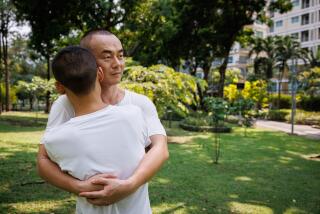Cultural Exchange: Xiyadie depicts homosexual love in Chinese paper-cuts
- Share via
BEIJING — Orgies and anal sex hardly seem the usual fodder of traditional Chinese folk art, but that is exactly what one Chinese artist is depicting in a series of provocative paper-cuts that are now being exhibited in Los Angeles for the first time.
Paper-cuts originated in Eastern Han Dynasty China (AD 25-220) and are hung on windows or doors for good luck. But instead of the usual decorative flowers and birds, Xiyadie, whose pseudonym means “Siberian Butterfly,” portrays graphic and daring depictions of homosexual love — long considered taboo in China.
“The Metamorphosis of a Butterfly,” open until July 14 at Flazh!Alley Art Studio in San Pedro, will be Xiyadie’s first exhibition abroad — and his first time on a plane. Xiyadie, who does not use his real name to mask his identity, was born in a farming village in northern Shaanxi province. Today — in addition to his artwork — he works in Beijing as a cleaner, handyman and cook. He, like millions ofChina’smigrant workers, sends money back to family; much of his roughly $190 monthly salary goes to his wife and two children, who live thousands of miles away in his hometown.
Like many gay men of his generation, Xiyadie, 48, married to appease parental pressure; failing to produce an heir is an unforgivable transgression of filial duty. (A Qingdao University professor who’s an expert on AIDS has estimated that 90% of homosexual men in China marry.) As such, Xiyadie’s works play powerfully on themes of guilt, entrapment and forbidden love. Above all, they tell a tale of being pulled by conflicting obligations.
“Tradition [in my village] is no less frigid than the Siberian air,” says Xiyadie, who chose his name because of the freezing winds which are said to blow down on Shaanxi from Siberia. “It is depressing to be gay in China — and even more horrifying in a village. It froze my wings, and I was unable to fly.”
Though tradition has trapped the artist, it has also given him the tools to create. Xiyadie has funneled his frustrations into his folk craft, leading to a small but burgeoning following in the gay community in Beijing, where his artworks have been exhibited in the Beijing LGBT Center. It was here that Jan Montoya, creative director of the Long Beach LGBT Center, first came across Xiyadie and introduced him to the alternative fine art gallery Flazh!Alley Studio. Traditional symbols are inserted into the works, providing an ironic mirror to a fast-changing society. “I often cut butterflies because I hanker for freedom,” Xiyadie says.
One piece is typical. From a distance it appears to be true to Xiyadie’s folk-art roots. The intricate paper-cut shows a moon shining down on a rural farmhouse. Two doves (tokens of peace) sit entwined in the gable and inside a woman with long plaited hair holds her child on a bed. It is a cozy, quaint setting. But something is amiss. Just outside the door a man performs oral sex on another. Look closer and it becomes apparent that the man has two faces. One face gazes at his male lover; the second face looks back toward his wife.
“It’s a bittersweet situation,” explains the soft-spoken Xiyadie, sitting outside his basic bedsit in Songzhuang, a hip artists’ community in Beijing’s suburbs. “There is a Chinese saying: You have food in your bowl and you want more from the pan. Sometimes I ask myself, I already have a wife, why do I have a boyfriend? It’s a picture about greed.”
Other paper-cuts depict similar scenarios, many set among the everyday charms of the countryside. In one a teenage boy enjoys an encounter with a train conductor (Xiyadie’s real former lover). In a series named “Door,” the ornate wooden Chinese double doors symbolize both restraint and opportunity.
Such settings are fraught with memories. “Coming out in my village has never crossed my mind, I wouldn’t dare. People would think I am a criminal,” he says. Asked if he’s told his wife, he nods. “I confided with my wife about the truth. She wept, then she accepted it.” His 21-year-old daughter and 23-year-old-son, who is severely disabled and cannot eat, drink or walk without aid, remain unaware.
The artist’s double life — on the one hand, as an active tongzhi (“comrade,” slang for “gay”); on the other a filial son, husband and father — also plays out in the very art he can show. Paper-cutting, passed down from generation to generation of women and particularly prevalent in Shaanxi, is a dying art; Xiyadie learned the skill from his mother. But many of the young who have left rural China for the city have discarded their heritage and swapped paper-cuts for iPads.
Xiyadie has been hailed for his agile fingers and innovative approach by experts trying to save the craft. But though the artist can showcase works that touch on non-sexual subjects, his homosexual pieces remain concealed from a more widespread audience.
“That ambivalence — that is the story of gay men in China. He’s constantly negotiating these different parts of his identity,” says Anna Sophie Loewenberg, director of “The Siberian Butterfly”, a short documentary produced by the Chinese nonprofit LGBT webcast Queer Comrades in association with the Internet TV show Sexy Beijing. The film will be posted online in an attempt to reachChina’sestimated 30 million homosexuals.
Until 2001, homosexuality was classified in China as a mental illness. Today, although not illegal — it was decriminalized in 1997 — it is also not encouraged by the authorities. (In 2010, the inaugural Mr. Gay China pageant was shut by police an hour before it was due to start.) Despite this, large cities like Beijing have gay nightclubs and active gay public figures.
Beijing-based Queer Comrades producer Stijn Deklerck believes Xiyadie’s influence is crucial. “He is definitely a role model of expressing sexuality through ways that are very traditional, showing that there is an alternative to being silent or leading a life in secrecy,” comments Deklerck.
Xiyadie says that he does not produce works to help gay activism and does not do it for money. Like the illiterate women who in times gone by used paper-cuts to express their emotions and goals, Xiyadie sees his art as a voice in a world where he has none.
“Art to me is a platform. I have stripped my soul until it is naked, layer by layer,” he says. “At first I doubted if I was normal. I tried to change myself, but I couldn’t. So I gave into nature. I hope to convey a message by my own experience that it takes all kinds. Why bother to force someone that likes red flowers to like white ones?”
Catherine Zheng contributed to this report.
More to Read
The biggest entertainment stories
Get our big stories about Hollywood, film, television, music, arts, culture and more right in your inbox as soon as they publish.
You may occasionally receive promotional content from the Los Angeles Times.










